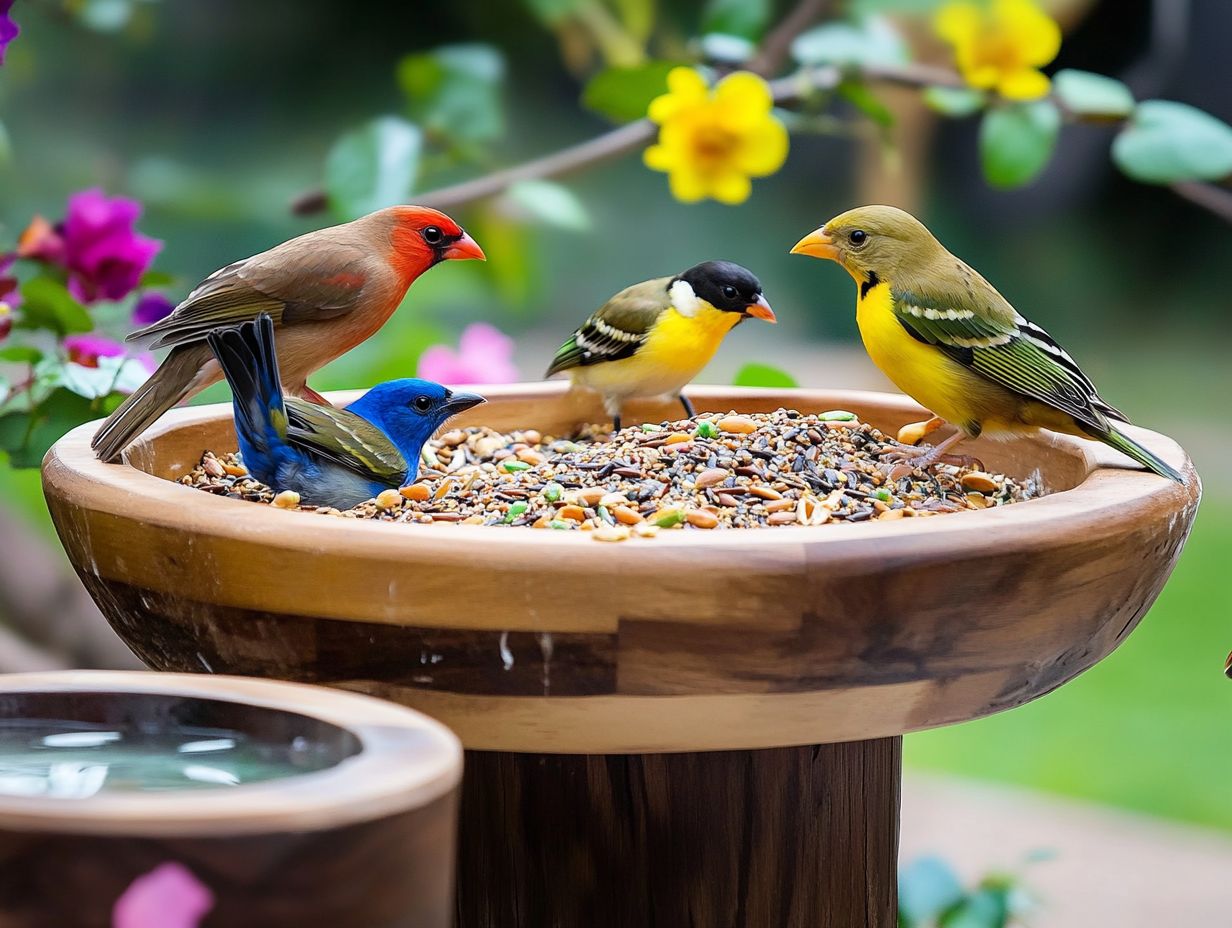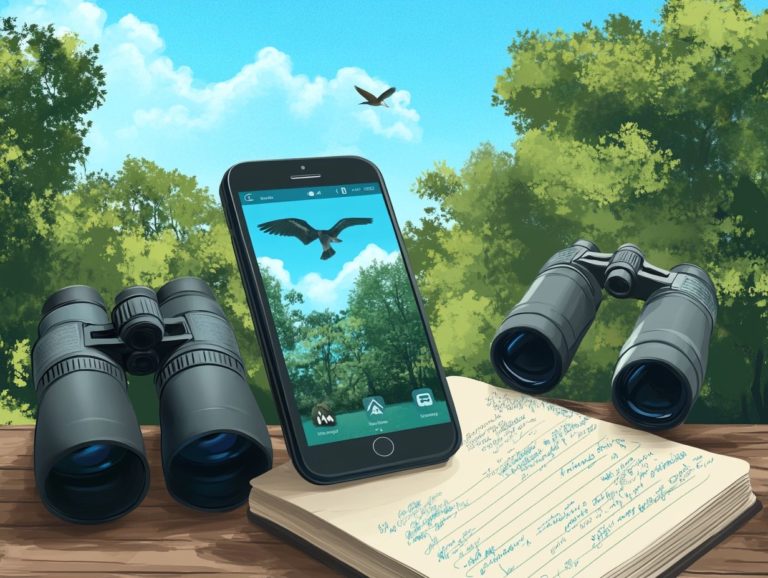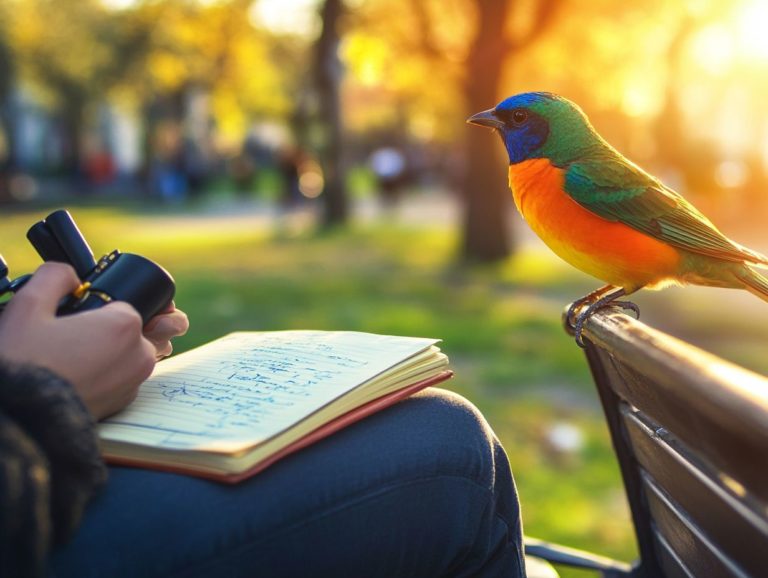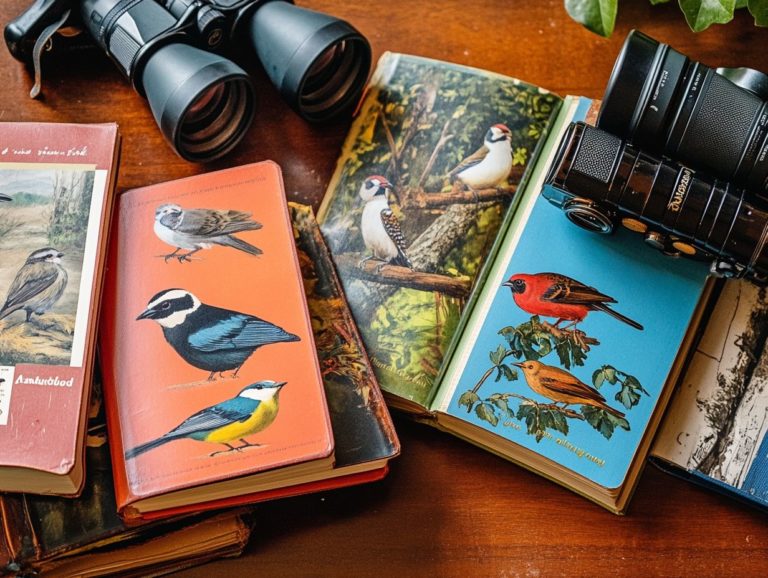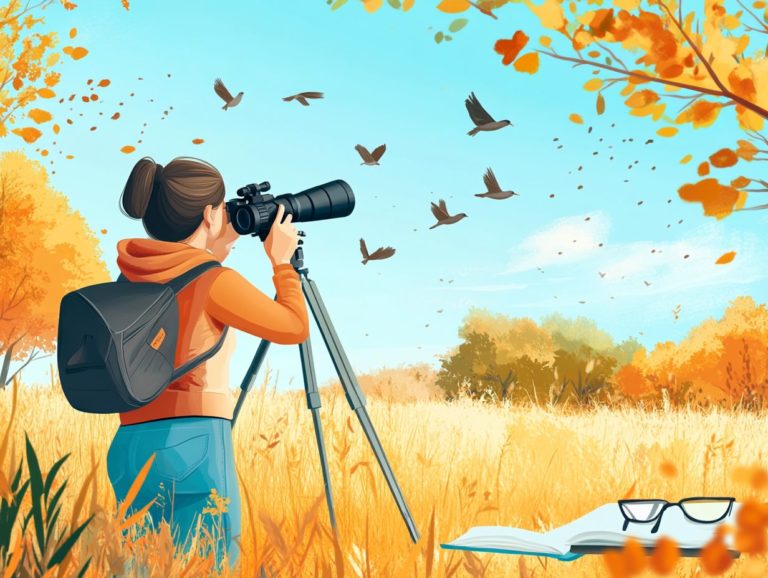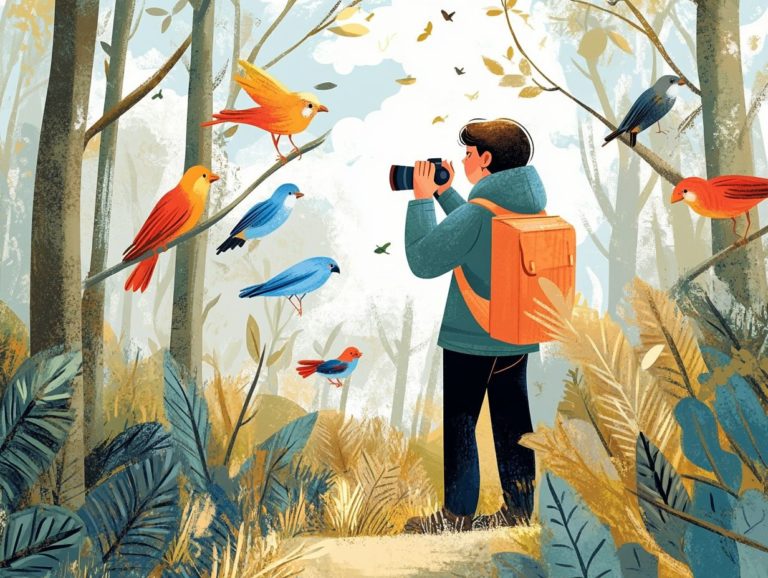What Do I Need to Know About Bird Feeding?
Feeding birds can transform your outdoor space into a vibrant haven, infusing it with joy and a deeper connection to nature.
This article delves into the myriad benefits of bird feeding, from enhancing local biodiversity to providing a delightful pastime that captivates the senses.
You ll discover various types of bird feeders, learn how to select the right food to attract specific species, and pick up essential tips to avoid common missteps.
We ll emphasize the importance of maintenance to ensure that your feathered friends remain happy and healthy.
Whether you re a seasoned bird enthusiast or a curious newcomer, there s something valuable here for everyone!
Contents
Key Takeaways:
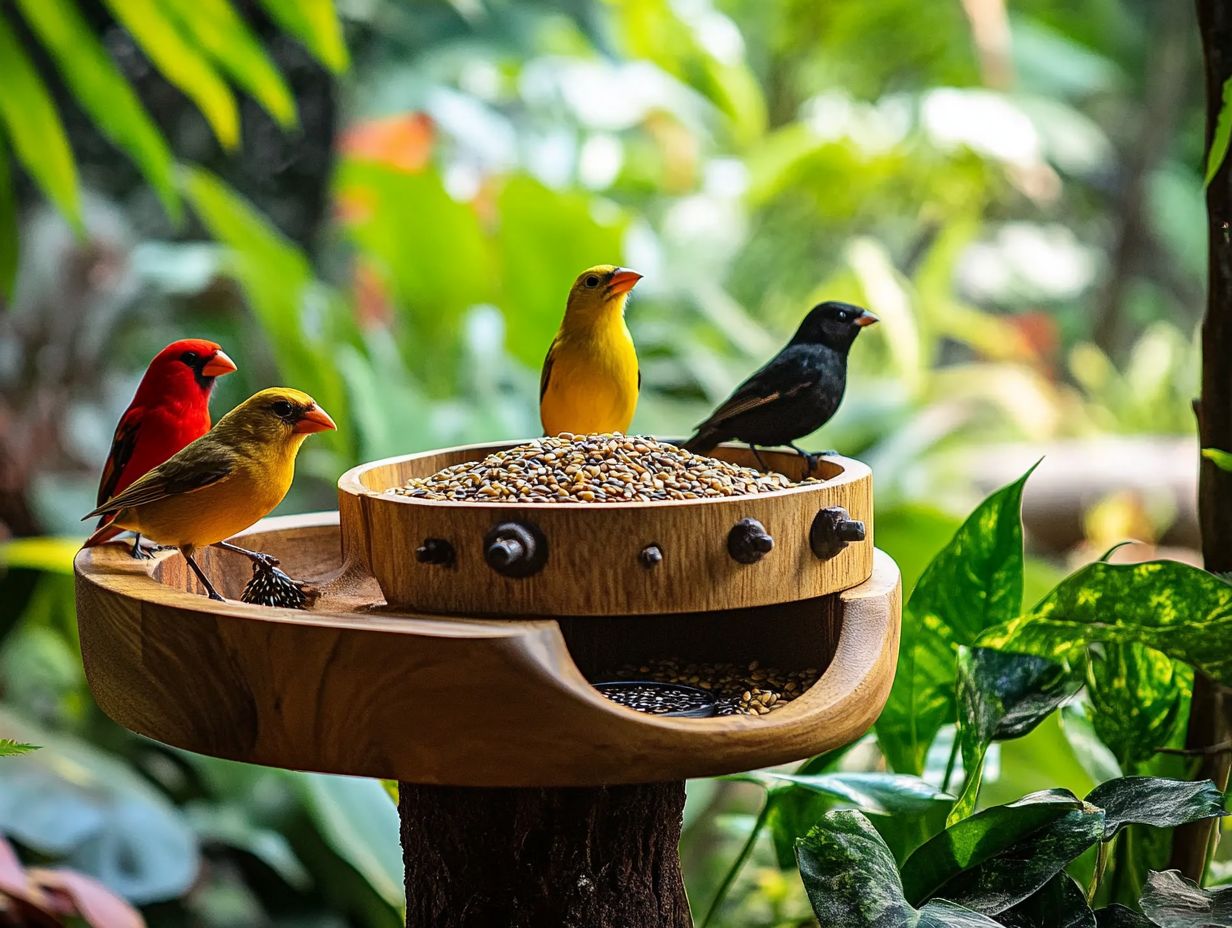
- Bird feeding can provide numerous benefits, such as attracting beautiful birds and aiding in their survival during harsh weather or habitat loss, including support for species like woodpeckers and hummingbirds.
- There are various types of bird feeders available, each with unique features and designs to suit different bird species and preferences.
- Choosing the right bird food is crucial, with options ranging from black oil sunflower seeds to fruits and insects, depending on the birds you want to attract.
Why Feed Birds?
Feeding birds in your outdoor space is not just a joyful pastime; it s a meaningful contribution to local wildlife. You offer essential nourishment and promote biodiversity, especially when using suet feeders, a type of bird food made from animal fat that many birds love.
For bird enthusiasts like you, witnessing a variety of species like woodpeckers, goldfinches, and hummingbirds can transform your garden into a vibrant sanctuary. By choosing the right bird feeders and food types, you can attract a diverse array of birds, enhancing your birdwatching experience while playing a vital role in the conservation of America s avian population.
Engaging in bird feeding deepens your connection with nature and fosters a profound appreciation for the beauty of birdlife, including the diverse bird food types you can provide.
The Benefits of Bird Feeding
Bird feeding presents a wealth of benefits, transforming your outdoor space with the vibrant presence of various bird species while positively impacting local ecosystems and biodiversity, including support for bluebirds and chickadees.
This delightful hobby offers an escape and a chance to dive into the exciting world of birds! It also serves as an educational experience for families, providing a fantastic way to learn about different avian species and their fascinating behaviors.
By installing bird feeders stocked with the right foods like sunflower seeds to attract charming chickadees and suet for those clever woodpeckers you can invite a diverse array of birds into your garden. This interaction nurtures a profound appreciation for wildlife and highlights the ecological significance of providing a steady food supply, especially crucial during migration and the winter months when food sources dwindle.
Types of Bird Feeders
Gaining insight into the various types of bird feeders is crucial for anyone aspiring to cultivate a welcome haven for birds in their outdoor space. Each feeder type is tailored to attract specific bird species and align with their distinct feeding behaviors.
- Squirrel-proof feeders effectively deter those pesky squirrels.
- Nectar feeders are expertly designed to draw in enchanting hummingbirds, while squirrel-proof designs help keep your feeder stations safe from pests.
- Suet feeders cater to woodpeckers and other birds with a penchant for high-fat foods.
- Ground-feeding stations provide an inviting setup for ground-feeding birds such as Juncos and sparrows.
Different Styles and Features
The style and features of bird feeders you choose can greatly influence the types of birds that grace your outdoor space. This ultimately enhances your birdwatching experience and reduces the risk of window collisions.
With an array of options at your disposal, you can select tube feeders that cater perfectly to smaller songbirds like finches. These feeders grant them easy access to sunflower seeds while keeping the larger birds at bay.
On the other hand, platform feeders offer a generous area for ground-feeding birds such as sparrows and doves. Their open design can effortlessly blend into any garden aesthetic.
If you want to combine usefulness and looks, hopper feeders are an excellent choice. They often mimic birdhouses and attract a diverse range of species.
Each type of feeder can be strategically positioned in various outdoor settings be it a cozy backyard, an expansive patio, or even nestled alongside trees. This ensures that every feeding station harmonizes with the natural environment while enticing feathered visitors to your space.
Choosing the Right Bird Food
Selecting the right bird food is essential for drawing a diverse array of birds to your feeders. It also promotes their health and well-being in your outdoor sanctuary.
Different types of bird food, such as black oil sunflower seeds and nyjer seeds small black seeds that goldfinches love cater to the unique tastes of various species. Suet blocks, favored by woodpeckers, also make great options.
Birdseed mixtures provide a balanced diet. They entice a delightful variety of wild birds, including sparrows, robins, and Carolina wrens, to visit your space.
Types of Seeds and Other Foods
Knowing what seeds and foods to choose can make your bird feeding station a hit! Selecting the right seeds can greatly enhance the variety of birds that grace your garden.
Take sunflower seeds, for instance; they are a favorite among finches and cardinals. Their high fat content keeps these birds energized throughout the day.
Nyjer seeds act like a beacon for goldfinches, offering essential proteins and nutrients to sustain their vibrant activity. Don t forget about peanuts whether shelled or unshelled, they are irresistible to woodpeckers and jays.
Peanuts serve as a rich source of fats. To elevate your bird buffet even further, consider mixing in fruits like apples or oranges. Also, don t overlook suet, as this mix will keep your feeders buzzing with activity, especially during winter.
Attracting Specific Bird Species
Attracting specific bird species hinges on your understanding of their unique feeding habits and habitat preferences. By tailoring your outdoor space and bird feeding strategies accordingly, you can create an inviting haven for them.
If you want to attract woodpeckers, consider setting up suet feeders. Hummingbirds will flock to nectar feeders filled with a sweet sugar-water mix.
Establishing ground-feeding stations with the right seeds will entice ground-feeding birds like juncos and sparrows. This will enrich your birdwatching experience.
Tips for Attracting Different Birds
Implementing effective birdwatching tips can significantly elevate your ability to attract a diverse range of birds to your outdoor space. This transforms the experience of feeding wild birds into something truly rewarding.
Select the right feeders tailored to the species you wish to entice perhaps tube feeders for finches or platform feeders for larger visitors. This will craft an inviting atmosphere.
Opting for high-quality bird food that appeals to various birds, such as sunflower seeds for cardinals or suet for woodpeckers, will enhance your chances of spotting a delightful array of wildlife.
Mindfully placing feeders away from windows is essential to minimize collisions, ensuring the safety of your feathered guests. As the seasons shift, it’s wise to adapt your feeding strategies.
Stocking up on high-energy foods during winter and providing a variety of seeds in summer will keep your avian friends returning throughout the year.
Common Mistakes in Bird Feeding
Bird enthusiasts often make common mistakes in bird feeding. Neglecting to clean your feeders can lead to harmful mold growth.
Don t overlook the risk of window collisions when positioning your feeders. Mindful bird feeding practices create a welcoming environment for your feathered friends.
Avoiding Potential Problems
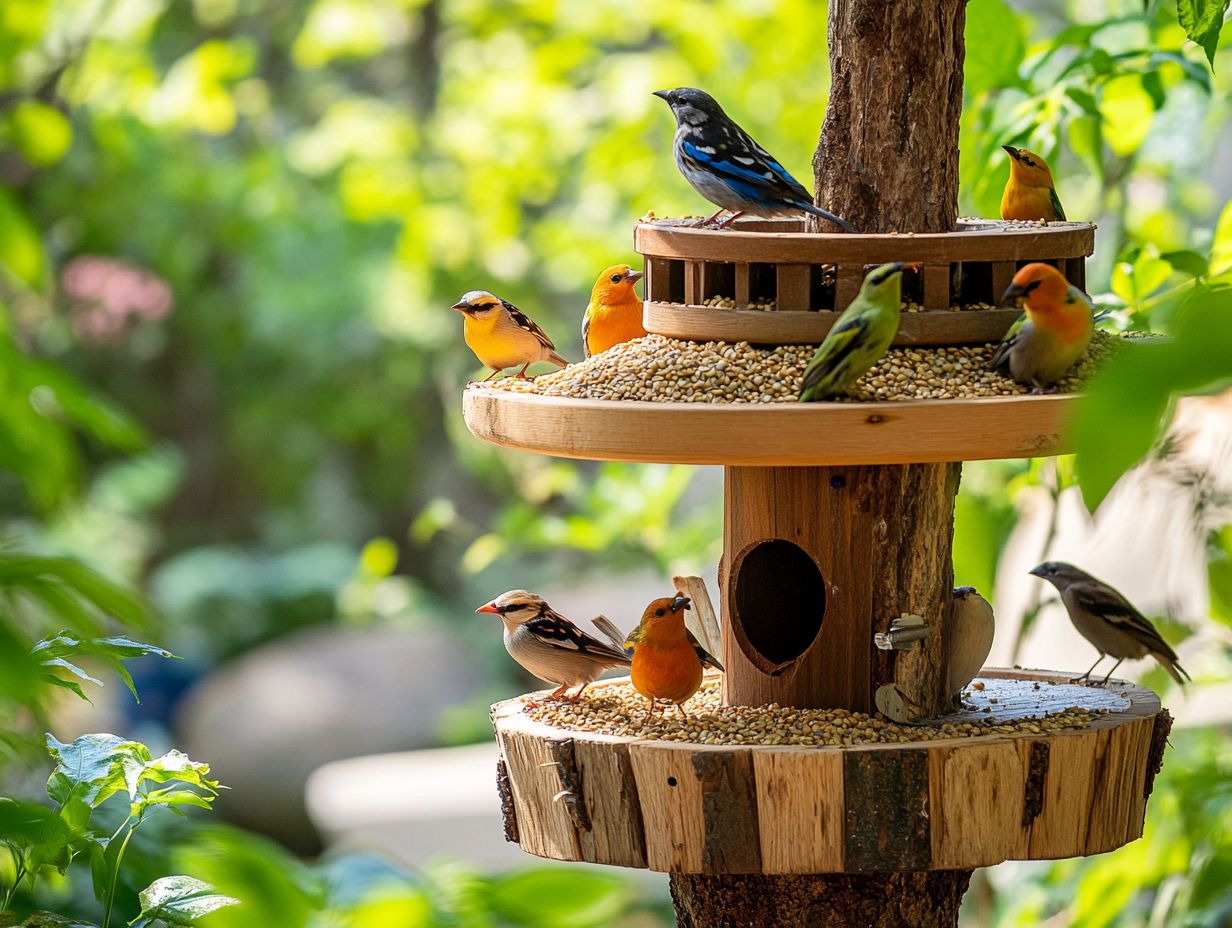
To create a rewarding bird feeding experience, be aware of issues like dirty feeders and poor food choices.
Dirty feeders can harbor harmful bacteria. Clean them regularly with vinegar and water to keep birds safe.
Using inappropriate food types can harm birds health. Avoid bread and junk food; instead, choose high-quality seeds or berries.
Place feeders at least 30 feet away from windows to reduce collision risks. This small step helps keep birds safe.
By addressing these issues, you can create a safer, more inviting atmosphere for your feathered friends.
Proper Maintenance of Bird Feeders
Proper maintenance is essential for the health of visiting birds and enhances your outdoor space. Regularly clean feeders to prevent mold and bacteria buildup.
Refill feeders consistently with the right food, like sunflower seeds and nyjer seeds. This keeps birds returning and creates a lively atmosphere.
Cleaning and Refilling Tips
Cleaning and refilling bird feeders are vital for a vibrant feeding environment. Clean feeders at least every two weeks to keep them mold-free.
Use hot, soapy water or a vinegar solution, and scrub off stubborn residue. Rinse thoroughly to avoid contaminants that could endanger birds.
Refill feeders in the late afternoon for the best results. Providing a mix of seeds, suet, and nuts attracts a wider range of species.
Frequently Asked Questions
What Do I Need to Know About Bird Feeding?
Bird feeding is a fun activity for backyard enthusiasts. Here are some essential tips before starting.
What types of food should I offer to birds?
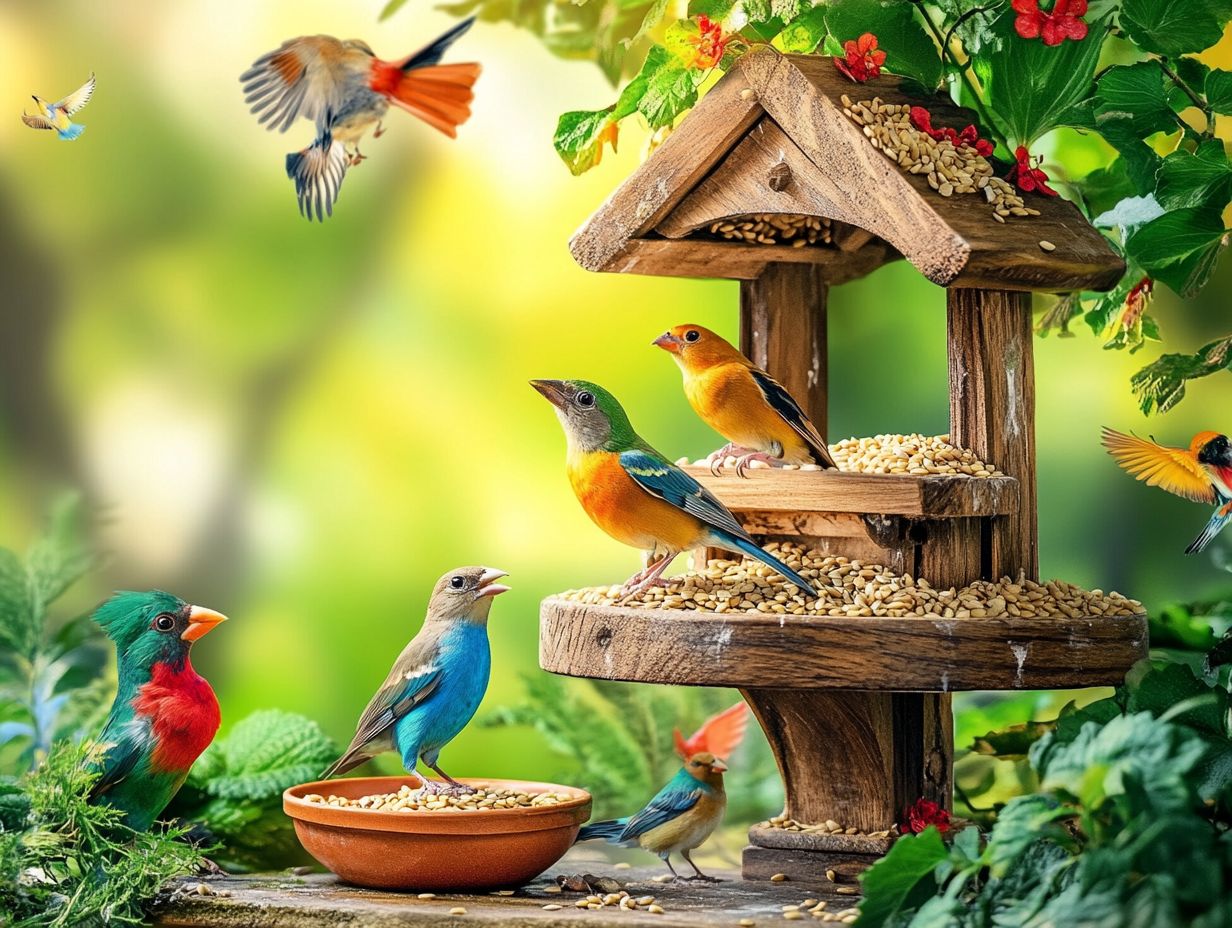
The best food for birds includes a variety of seeds, suet, and nuts. Different species prefer different foods, so offer a mix to attract many birds.
What kind of feeder should I use?
Choosing the right bird feeder can transform your garden into a vibrant bird haven. Think about the birds you d love to attract and the food they’ll enjoy!
How often should I clean my bird feeder?
Keep your feathered friends safe! Clean your feeder every two weeks or more often if you see dirt or mold.
Is it okay to feed birds in the summer?
Feeding birds in summer is crucial! It helps them find food for their young and keeps them visiting your garden.
What are some common mistakes to avoid when feeding birds?
Avoid using spoiled food. It hurts birds and can bring pests. Always refill your feeder with fresh food!
Do I need to provide water for birds?
Water is essential for birds! A clean birdbath can attract a range of species. Change the water regularly to keep it safe.

